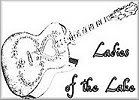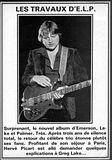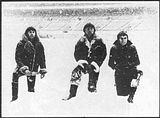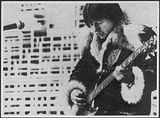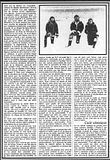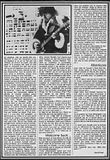The Works of ELP
The new ELP album is surprising. Very surprising. After three years of total silence, the trio's comeback leaves their fans astounded. Taking advantage of Greg Lake's stay in Paris, our reporter went to ask him for some explanations...
Three years of silence. We were worried: had they split discreetly? Then, rumours came regularly
to reassure us: they are still together. They are preparing a great comeback. We were happy. ELP
had always accustomed us to great things whatever their (numerous) detractors say, and they knew,
nearly too cleverly, how to reconcile the demands of an intelligent/intellectual music,
frantically progressive (and this despite the classical tastes of Emerson) to those of sheer rock
'n' roll entertainment. Unfortunately, we don't rejoice anymore after we've listened to "Works",
their new double album. "Works" suffers from several irremediable diseases: megalomania, classical
cancer, lack of logic. Megalomania: each of the lads is now a VIP who has booked one side of these
"works". Classical cancer: the orchestra strikes again and we are stuck in centuries' old clichés of
obsolete musical tradition. Lack of logic: after three second-rate individual sides, the common one is
excellent and proves the concept's emptiness. Why then having persisted? In short, "Works" is a problem,
apart from the displeasure and disappointment it produces.
Emerson, Lake and Palmer were in Paris to
record the second volume of this thing. It was a good opportunity to meet them and ask for some
explanations. Once having cleared the obstacles put in my way by a very fussy, Pink Floyd style,
management ("no photos, no photos"), I was able to corner Greg Lake, a hazardous manoeuvre as he has put
on some weight. Though polite, he was obviously on the defensive, rather uncomfortable, as if suddenly he
wasn't sure of the merits of his musical approach any more. By the way, what is he doing in Paris with his
two mates?
«We are recording the second volume of "Works" in the Pathé studio. We had already worked
there for the first volume and were very pleased. It's very nice to work there, it's professional enough
and much more relaxed. The record is just finished, as we speak.»
A doubt came up. Were they going to play the same dirty trick again? Would the same questionable principle
govern this new album?
«Yes, it will be the same basic idea: three individual creations and a common
one. But it will be a single album. We had some tapes left after having selected the pieces for the double
album. Instead of releasing a triple album, our original intention, we preferred to release a single one
which would be a sequel.»
But why haven't they chosen to release solo albums like Yes, avoiding the detrimental frictions brought about by
individual yearnings within the group? If one easily admits that a band can have problems of
individuality, one can also admit its remedies. The solution chosen by ELP is prejudicial both to
individual assertion and common creation. It forces the audience to listen to the personal tastes of each
musician without being able to choose. On the other hand, one must also admit that solo albums are the
sign that a band is dying...
«I think solo albums can't be a good thing because they don't happen when the
band is dying but on the contrary when a man's personality is dying. We don't need to release solo albums
because we have our own identity, because we are called Emerson, Lake and Palmer. The problem arises when
you have a band called Yes or The Rolling Stones where personal identities are hidden behind the band's
name. And if a musician is searching for his personal identity then he must make a solo album which is
connected with his name, something which is very important. When we set up ELP, we decided to keep the
personalities intact. And there's always an idea of personal competition behind it. But we are a band
without personal problems because we have accepted its personalities. It is thus logical that we produce
solo sides. It's in accordance with the rules of our association. The group must take individual yearnings
into account. We don't need solo albums, that's for unhappy musicians and we are not.»
That's a very interesting concept indeed...but from the audience point of view, it's not completely
satisfactory. People like the band because of the musical relationship between its three members.
But do they have to like what each musician likes?
«When we write music, we don't do it with the
idea that people will like it, but because we believe in it, because it's what we want to create. I hope
people will like it, that it will be a commercial success, but it's never the basic impulsion. And if you
look closer, you'll realize that we haven't changed that much. I've always played quiet acoustic pieces,
Keith has always played the piano. With this album we wanted to go further into the different aspects of the
band. We wanted to bring about more emotion by spending more time and care in the writing. If you want to
evolve, you can't stick to what people like. It's up to us to make them like other things.»
However, fans - and critics - are likely to enjoy only the common side and never listen to the other ones.
«It's obvious that people will first listen to and like the fourth side because it has a sound they already
know. But later, they will also listen to the other sides and they will slowly get accustomed to them. It's not
important if they don't like all of them, that's not the main point, but they can make their choice among what
is being offered. But we really don't think about all this when we write the music, we just try to give our
best, that's all that comes to our mind.»
If we admit this concept, is the band really satisfied? Is each side the real image of the musical
personality of each member? Is Keith Emerson so classical at heart?
«It's hard to say if each side really
corresponds to each personality. It's very difficult for yourself, so for somebody else...I think each side
shows the ambition of each of us, what he wants to be in music. Keith's ambition is to compose, mine is to
sing, Carl's is to play the percussion. And that's it. When you say Keith is classical, you go too far.
No-one can say what is classical today and what is not. Critics and people's tastes are just momentary.
Music will stay and it's 20 or 50 years later that we'll see what is classical and what is not. We are making
the music of today, we don't copy anything. When we compose, we feel it's an event of the present day.»
This proves that Greg Lake is as good a bass-player as a sophist. Because a musician who plays classical music
like Emerson does on his side can't pretend to make contemporary music. Ant if they pride themselves on
writing the music of today, isn't it contradictory to use old-fashioned classical instruments when electronics
provide today's means of expression?
«For us, the electronic aspect of the band is a restriction. It
confines us to a single sound which is limited. That's why we decided to use an orchestra on the album. We
wanted to become a band playing with an orchestra on our records. Of course, we won't be able to use it on
stage. That's why there will be two parallel ELPs: an electronic one on stage and another one with orchestra
on records. Electronic music is not the music of today but of yesterday. It's too limited, it's already dead.
What is innovation? A guitarist who plays a blues line that 20,000 guitarists have already played but who
plays it with new feelings, that's innovation. I know that an orchestra is related to the past and that no
band with an orchestra has been successful so far. That's because they were not ready or too bound to the
past. But we want to play new music with an orchestra, it has countless possibilities. And that's the music
of tomorrow.»
This definition of innovation is a nice piece of sophism again. No comment. No-one will be surprised to
hear that ELP find synthesizers limited as the keyboardist in charge, although very famous, can't program
his synthesizers himself and must therefore be frustrated. Specialists say synthesizers' possibilities are
infinite. Then, who makes the music of yesterday? But let's get back to more down-to-earth details about
"Works". Why this title?
«The album is called "Works" because it really demonstrates what the band is,
three individuals who work both together and separately. It also shows that we still exist through our
work.»
Was the rule of the game that each had to work on his own with session men?
«Yes and no. The idea
was to show each individual, to have only what he feels like saying and doing. How it was produced didn't
matter. Keith plays on Carl's side. I worked with session men. If we had all played on each side, there
would have been three ELP sides and that's not what we wanted.»
But why this long silence of about three years? Was it to polish up the job or was it the obvious sign that
an ELP era had ended with "Welcome back my friends..." and that another one had started, that the band was
looking for a new dimension?
«That's right. It's because we had decided to change, to become another ELP.
We had served our time in a certain kind of music, time had come to change. After the last world tour, we
thought about our situation. We could have kept on touring and playing electronic music but we didn't feel
happy anymore. As the triple album looked like a summary, we seized the opportunity and decided to make
something new. We gathered our energy to go into a new direction. And it took us a lot of time to perfect the
orchestra formula. On the other hand, we wanted to go back on the road with the maximum of new songs because
the orchestra can't tour with us. So, during these three years of apparent silence, we produced in fact three
records: the double one and the single one. Now we have enough material to appear under our new light.»
Does that mean there will be a tour very soon?
«We will shortly go to Montreal to
prepare our new tour. We will play in the US during the first half of the summer, and in Europe, in
England, in France during the second half. It will just be a musical show. Visual shows are very expensive
and we are a small band.»
Pete Sinfield, the former King Crimson poet, was in Paris together with Lake. He is now their lyricist as well
as a production assistant. What has become of him as a solo artist?
«I have a solo album which
is half finished. I started it a long time ago but I had to stop in order to work with ELP. When I went
back to it, I had changed my mind and I was back to square one. It will be a more accessible album, my
"pop star" album.»
As I had two ex-Crimson members at hand, the conversation naturally came to this band. For Lake, it was a magical band, but it died after the first split. For Sinfield, «it became Robert Fripp's band, what it wasn't during the first make-up. The reason why the band had so many different aspects is that Fripp is very changing, he's got a multi-faceted talent.»
Another question was worrying me: what has become of Manticore, whose label doesn't appear on the new album? Had the
trio's own record company vanished into the worldwide economic slump?
«The
reason why we are no more on Manticore is very simple. We had a contract in the US with Atlantic.
We were satisfied with it because we couldn't work about the orchestra project and take care of
our label at the same time. It was impossible. So we forgot Manticore for the moment. But we
haven't lost our freedom. We can still do whatever we want.»
That's the main point for them. But for us???
- ©1977 Best. All rights reserved.
